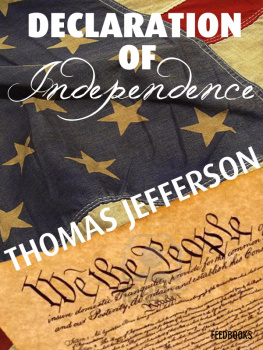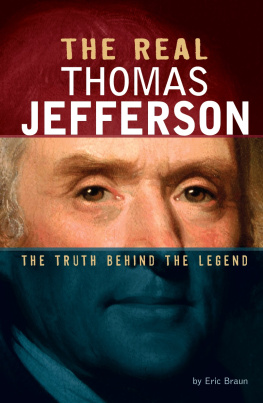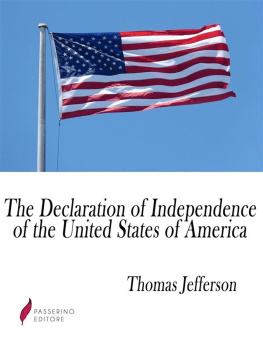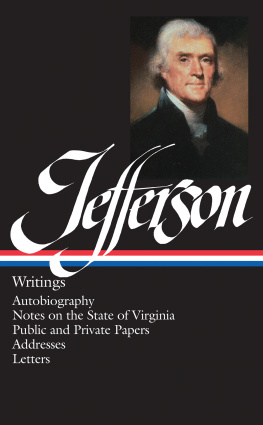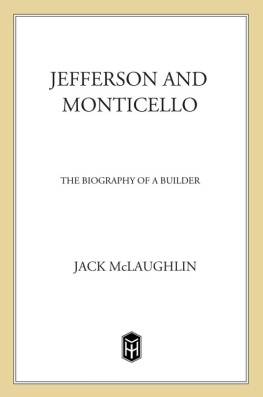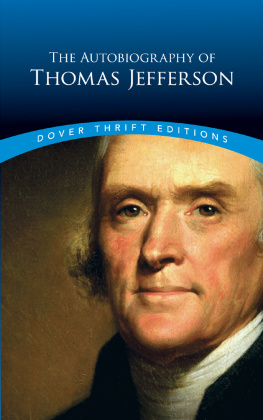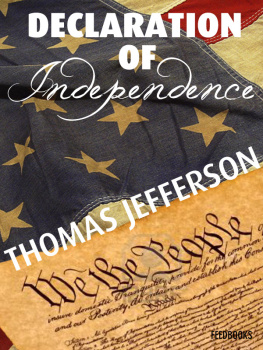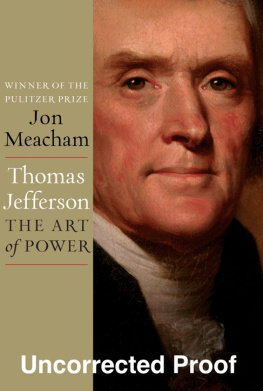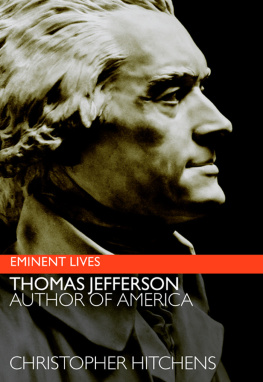About Jefferson:Thomas Jefferson (April 13, 1743 July 4, 1826) was the thirdPresident of the United States (18011809), the principal author ofthe Declaration of Independence (1776), and one of the mostinfluential Founding Fathers for his promotion of the ideals ofrepublicanism in the United States. Major events during hispresidency include the Louisiana Purchase (1803) and the Lewis andClark Expedition (18041806). As a political philosopher, Jeffersonwas a man of the Enlightenment and knew many intellectual leadersin Britain and France. He idealized the independent yeoman farmeras exemplar of republican virtues, distrusted cities andfinanciers, and favored states' rights and a strictly limitedfederal government. Jefferson supported the separation of churchand state and was the author of the Virginia Statute for ReligiousFreedom (1779, 1786). He was the eponym of Jeffersonian democracyand the co-founder and leader of the Democratic-Republican Party,which dominated American politics for a quarter-century. Jeffersonserved as the wartime Governor of Virginia (17791781), firstUnited States Secretary of State (17891793) and second VicePresident (17971801). A polymath, Jefferson achieved distinctionas, among other things, a horticulturist, statesman, architect,archaeologist, paleontologist, author, inventor and founder of theUniversity of Virginia. When President John F. Kennedy welcomedforty-nine Nobel Prize winners to the White House in 1962 he said,"I think this is the most extraordinary collection of talent and ofhuman knowledge that has ever been gathered together at the WhiteHouse with the possible exception of when Thomas Jefferson dinedalone." Source: Wikipedia
Note: This book is brought toyou by Feedbooks
http://www.feedbooks.com
Strictly for personal use, do not use this file for commercialpurposes.
WHEN in the course of human events, it becomes necessary for onepeople to dissolve the political bands which have connected themwith another, and to assume among the powers of the earth, theseparate and equal station to which the laws of nature and ofnature's God entitle them, a decent respect to the opinions ofmankind requires that they should declare the causes which impelthem to the separation.
We hold these truths to be self-evident: That all men arecreated equal; that they are endowed by their Creator with certainunalienable rights; that among these are life, liberty, and thepursuit of happiness; that, to secure these rights, governments areinstituted among men, deriving their just powers from the consentof the governed; that whenever any form of government becomesdestructive of these ends, it is the right of the people to alteror to abolish it, and to institute new government, laying itsfoundation on such principles, and organizing its powers in suchform, as to them shall seem most likely to effect their safety andhappiness. Prudence, indeed, will dictate that governments longestablished should not be changed for light and transient causes;and accordingly all experience hath shown that mankind are moredisposed to suffer, while evils are sufferable than to rightthemselves by abolishing the forms to which they are accustomed.But when a long train of abuses and usurpations, pursuinginvariably the same object, evinces a design to reduce them underabsolute despotism, it is their right, it is their duty, to throwoff such government, and to provide new guards for their futuresecurity. Such has been the patient sufferance of these colonies;and such is now the necessity which constrains them to alter theirformer systems of government. The history of the present King ofGreat Britain is a history of repeated injuries and usurpations,all having in direct object the establishment of an absolutetyranny over these states. To prove this, let facts be submitted toa candid world.
He has refused his assent to laws, the most wholesome andnecessary for the public good.
He has forbidden his governors to pass laws of immediate andpressing importance, unless suspended in their operation till hisassent should be obtained; and, when so suspended, he has utterlyneglected to attend to them.
He has refused to pass other laws for the accommodation of largedistricts of people, unless those people would relinquish the rightof representation in the legislature, a right inestimable to them,and formidable to tyrants only.
He has called together legislative bodies at places unusualuncomfortable, and distant from the depository of their publicrecords, for the sole purpose of fatiguing them into compliancewith his measures.
He has dissolved representative houses repeatedly, for opposing,with manly firmness, his invasions on the rights of the people.
He has refused for a long time, after such dissolutions, tocause others to be elected; whereby the legislative powers,incapable of annihilation, have returned to the people at large fortheir exercise; the state remaining, in the mean time, exposed toall the dangers of invasions from without and convulsionswithin.
He has endeavored to prevent the population of these states; forthat purpose obstructing the laws for naturalization of foreigners;refusing to pass others to encourage their migration hither, andraising the conditions of new appropriations of lands.
He has obstructed the administration of justice, by refusing hisassent to laws for establishing judiciary powers.
He has made judges dependent on his will alone, for the tenureof their offices, and the amount and payment of their salaries.
He has erected a multitude of new offices, and sent hitherswarms of officers to harass our people and eat out theirsubstance.
He has kept among us, in times of peace, standing armies,without the consent of our legislatures.
He has affected to render the military independent of, andsuperior to, the civil power.
He has combined with others to subject us to a jurisdictionforeign to our Constitution and unacknowledged by our laws, givinghis assent to their acts of pretended legislation:
For quartering large bodies of armed troops among us;
For protecting them, by a mock trial, from punishment for anymurders which they should commit on the inhabitants of thesestates;
For cutting off our trade with all parts of the world;
For imposing taxes on us without our consent;
For depriving us, in many cases, of the benefits of trial byjury;
For transporting us beyond seas, to be tried for pretendedoffenses;
For abolishing the free system of English laws in a neighboringprovince, establishing therein an arbitrary government, andenlarging its boundaries, so as to render it at once an example andfit instrument for introducing the same absolute rule into thesecolonies;
For taking away our charters, abolishing our most valuable laws,and altering fundamentally the forms of our governments;
For suspending our own legislatures, and declaring themselvesinvested with power to legislate for us in all caseswhatsoever.
He has abdicated government here, by declaring us out of hisprotection and waging war against us.
He has plundered our seas, ravaged our coasts, burned our towns,and destroyed the lives of our people.
He is at this time transporting large armies of foreignmercenaries to complete the works of death, desolation, and tyrannyalready begun with circumstances of cruelty and perfidy scarcelyparalleled in the most barbarous ages, and totally unworthy thehead of a civilized nation.

